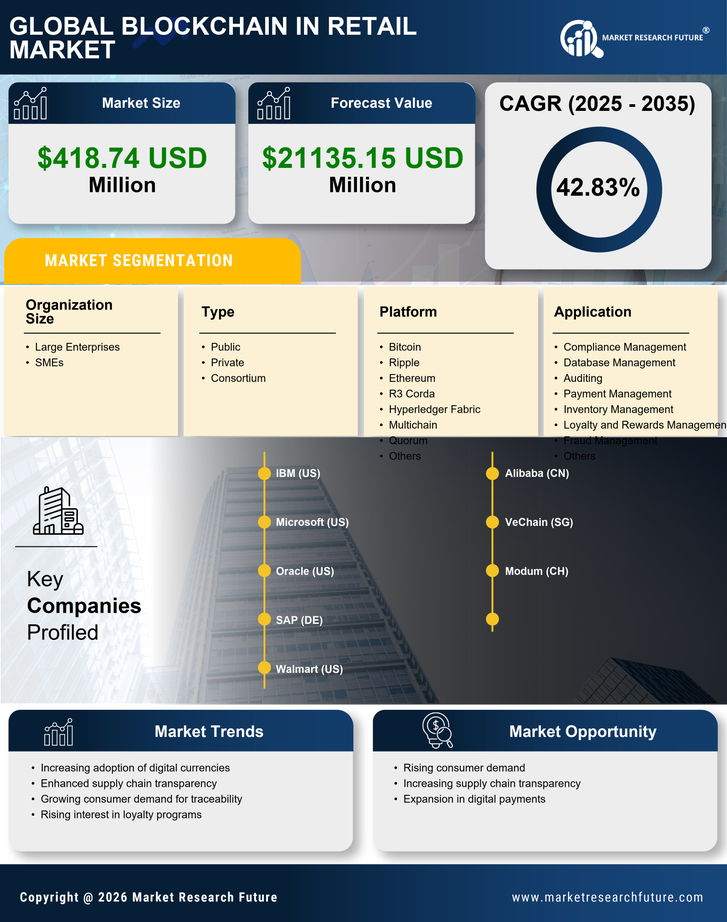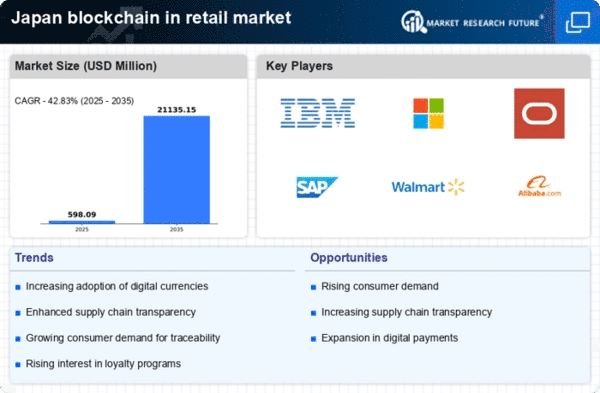Increased Focus on Cybersecurity
As the blockchain in-retail market expands, the emphasis on cybersecurity becomes increasingly critical. Retailers in Japan are recognizing the potential vulnerabilities associated with digital transactions and data management. Blockchain technology, with its inherent security features, offers a robust solution to mitigate risks related to data breaches and fraud. A recent study indicates that cyberattacks on retail businesses have increased by 40% in the past year, prompting retailers to invest in blockchain solutions that enhance data integrity and security. By prioritizing cybersecurity through blockchain, retailers can protect consumer information and maintain trust, which is essential for long-term success in the market.
Rising Consumer Demand for Authenticity
In the context of the blockchain in-retail market, there is a notable increase in consumer demand for authenticity and traceability of products. Japanese consumers are becoming increasingly aware of the origins of their purchases, particularly in sectors such as food and luxury goods. This trend is evidenced by a survey indicating that approximately 70% of consumers in Japan express a preference for brands that provide transparent information about product sourcing. Blockchain technology offers a solution by enabling retailers to provide verifiable information about product origins, thus enhancing consumer trust. As a result, retailers adopting blockchain solutions may experience a competitive advantage, potentially leading to increased market share and customer loyalty.
Emergence of Collaborative Retail Models
The blockchain in-retail market is also being driven by the emergence of collaborative retail models that leverage shared resources and data. In Japan, retailers are increasingly exploring partnerships that utilize blockchain to create shared platforms for inventory management and customer engagement. This collaborative approach not only reduces operational costs but also enhances the customer experience by providing seamless access to products and services. Market analysis suggests that collaborative models could lead to a 25% reduction in supply chain costs for participating retailers. As these models gain traction, they may redefine traditional retail dynamics, fostering innovation and efficiency in the blockchain in-retail market.
Regulatory Support for Blockchain Adoption
The blockchain in-retail market in Japan is witnessing a favorable regulatory environment that encourages the adoption of blockchain technologies. The Japanese government has been proactive in establishing guidelines and frameworks that support the integration of blockchain in various sectors, including retail. For instance, the Financial Services Agency (FSA) has introduced measures to promote innovation while ensuring consumer protection. This regulatory support is likely to facilitate investment in blockchain solutions, with projections suggesting that the market could grow by over 30% in the next five years. Retailers that align with these regulations may find themselves better positioned to leverage blockchain for operational efficiency and enhanced customer engagement.
Integration of IoT with Blockchain Solutions
The convergence of Internet of Things (IoT) technology with blockchain in the retail sector is emerging as a pivotal driver. In Japan, the integration of IoT devices with blockchain systems allows for real-time data collection and analysis, enhancing supply chain management and inventory control. This synergy is particularly relevant in sectors such as logistics and food safety, where tracking and monitoring are crucial. Reports indicate that the IoT market in Japan is expected to reach ¥1 trillion by 2025, and its integration with blockchain could streamline operations, reduce costs, and improve transparency. Retailers that harness this technology may gain a significant edge in the competitive landscape.

















